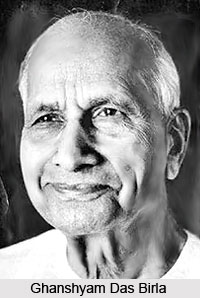 Ghanshyam Das Birla, a doyen of Indian industry was the man who laid the foundations of the Birla Empire and the Federation of Indian Chambers of Commerce and Industry (FICCI). He is also popularly known as the builder of Birla Mandirs.
Ghanshyam Das Birla, a doyen of Indian industry was the man who laid the foundations of the Birla Empire and the Federation of Indian Chambers of Commerce and Industry (FICCI). He is also popularly known as the builder of Birla Mandirs.
This Indian businessman was born on 10th April 1894. His grandfather Shiv Narayana Birla from the traditional marwari business of lending money against pawned item diversified his business. To establish business in cotton dealership he moved to Mumbai with a modest capital and left the hometown Pilani in Rajasthan. There was no looking back after that as the venture was successful. He came back to Pilani to build a huge mansion by the name `Birla Haveli`. Ghanshyam Das Birla died in 1983 at the age of 90. There is a memorial to Ghanshyam Birla in Golders Green Crematorium, Hoop Lane, London. It comprises a large statue overlooking the gardens with an inscription.
Ghanshyam Das Birla entered the business arena during the time of First World War and moved further to diversify them into other areas. He established a cotton mill in Sabzi Mandi, and later established Keshoram Cotton Mills. He wanted to turn the pawned items business into manufacturing business. Along with cotton mills he diversified to jute business and shifted his base to Calcutta city in Bengal, which was the world`s largest jute producing region. He established Birla Jute Mills in Bengal, much to the consternation of established European merchants. This noted businessman had to cover a number of obstacles as the British and Scottish merchants with unethical and monopolistic methods tried to close his business. Birla`s business reached its pick when supply problem arises throughout the British Empire due to World War I.
With an investment of Rs.50 lakhs in 1919, the Birla Brothers Limited was formed. A mill was set up in Gwalior in the same year. In 1930s, G.D. Birla set up Sugar and Paper mills. In 1940s, he ventured into the territory of cars and established Hindustan Motors. After independence, Ghanshyam Das Birla invested in tea and textiles through a series of acquisitions of erstwhile European companies. He also expanded and diversified into cement, chemicals, rayon and steel tubes.
A close associate of Mahatma Gandhi, G.D Birla was the most important pre-Independence contributor to the Indian National Congress. He also advised Gandhiji on economic policies. After independence, the Birlas expanded their business and started production in many fields. Near Mirzapur, he, in collaboration with Caesar, an American friend, set up an Aluminum Plant `Hindalco`. Ghanshyam Das Birla also founded several educational institutions. Birla Institute of Technology and Sciences (BITS) Pilani has today evolved into one of India`s best engineering schools. He also established many temples, planetariums, and hospitals.
In 1957, he was awarded India`s second highest civilian honour, the "Padma Vibhushan" by the Government of India. G.D. Birla award for scientific Research has been established to encourage scientists for their contribution in the various fields of scientific Research in his honor. The Birla family is one of the foremost business houses in India. During the decades of 70`s and 80`s, Birla brothers were among the topmost Industrial Houses of India. Their businesses vary from petrochemicals and textiles to automobiles and Infocomm.






